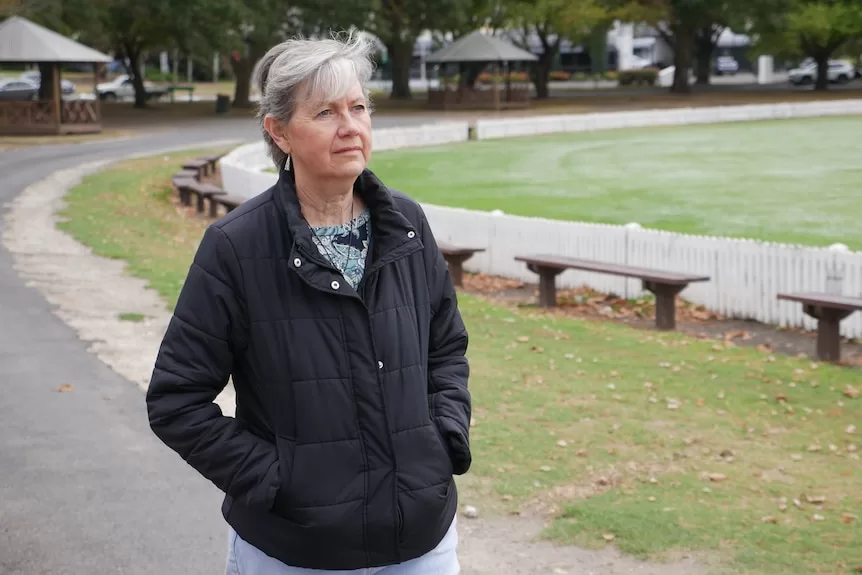Mount Gambier woman Anelia Blackie knows one day she will get a call that will prompt her to sell her house and move her life away from her home town.
She was diagnosed in 2020 with uterine leiomyosarcoma, a rare cancer that starts in soft tissue and can spread quickly.
Ms Blackie’s cancer has progressed to stage four.
Her cancer is so rare, a chemotherapy drug is yet to be created, meaning radiotherapy and surgery are the only treatment methods available.
But despite living in South Australia’s second-largest city, there is no radiation treatment service in Mount Gambier.
Ms Blackie has for the past three years had to make the uncomfortable five-hour car trip to Adelaide for treatment of the cancer in her spine.
She has had to make the trip there and back as many as six times a month.
While she could claim some travel expenses and get accommodation in the Cancer Council’s Adelaide lodge, she said it was not the same as receiving treatment at home.
“What they do not consider is the emotional toll it takes on you with every visit and the anxiety involved between all these appointments,” she said.
“When you know there’s a tumour growing on your spine or in your lung, you want it out as soon as possible, you want it treated as soon as possible, but the whole process takes forever.”
Ms Blackie said her cancer would one day become terminal and regular radiation therapy would become one of the only ways to relieve pain, meaning she would have to move permanently to Adelaide to live comfortably.
“It’s different for everyone, but I worked very hard to pay off my house and to be mortgage free,” she said.
“If you get to the point where you’re terminal and you need to move to Adelaide, you need to pay rent, or buy a new place, or find some accommodation on a long-term basis.
“You need to make this big relocation, which is stressful in itself, but then, as a sick person, to do that it’s really going to take its toll.”
Three months away from home
Ms Blackie is one of hundreds of Mount Gambier residents who have signed a petition calling for radiation therapy services to be brought to the town and the wider Limestone Coast region.
Health company Icon submitted plans to the then-Coalition federal government in 2021, which said it would only fund half of the project if the SA government funded the other half, which it declined to do.
It instead promised funding to upgrade cancer services at the Mount Gambier hospital.
Deanne Carmody is one of the leaders of the Radiation Treatment for Limestone Coast community group, which organised the petition.
In 2017, her 24-year-old son Scott was found to have a grapefruit-sized cancerous tumour on his brain and was not expected to survive an emergency flight to Adelaide.
He survived and undertook three months of radiation therapy as part of his recovery.
Ms Carmody and her son’s father took turns travelling to Adelaide while Scott was having treatment, while she also ran her own small business.
“There’s not only the cost of it and the travelling and uprooting, but it’s the psychological need for people who don’t cope,” she said.
“Scott needed a specialist therapist because he was OK with his cancer, but he wasn’t OK not being at home.”
An MRI last week showed Scott’s condition was stable.
Another feasibility study is now underway into setting up a radiation therapy service in Mount Gambier.
Limestone Coast Local Health Network governing board chair Grant King said the region had lacked the resources to support such a service, including having enough qualified staff and maintaining specialist equipment.
“It hasn’t been demonstrated as a feasible service that’s able to be put in place with the current clinical capabilities we have in this region,” he said.
“It’s why the first step is to look at all of these areas that need to be covered off before we take that step.
Mr King was on the board which recommended the SA government not fund Icon’s application.
He said the previous application to establish radiotherapy in Mount Gambier lacked detail about clinical “wrap around” services needed to support it.
“All of these things need to be addressed, they hadn’t been addressed,” he said.
“It was clear to us as a board to do this properly, and to thoroughly understand what we need to do we need to have a piece of work done that looks at all of those areas.”
‘Walk a mile in my shoes’
Brian Hueppauff said he needed to travel to Adelaide for radiation treatment for aggressive and advanced prostate cancer.
He said while initial treatments looked promising, the cancer had since spread to his hips and to his spine.
In addition to receiving chemotherapy, Mr Hueppauff said he undertook a treatment that was shorter but more intense than traditional radiotherapy.
He said it meant he needed to be fitted into a mask that did not allow him to move during the treatment.
“I was fortunate enough to get into Greenhill Lodge and I can’t say enough how much I appreciate the people there and the work that they do for you,” he said.
“But the thing I found the most distressing is, I didn’t have my wife to talk to, I didn’t have my own bed, I didn’t have my creature comforts around me even though it was a nice room and everything.”
Mr Hueppauff said regional cancer patients deserved to undertake treatment with the same comforts as those in the city.
“Walk a mile in my shoes, see what I’ve gone through, be in the same sort of situation and see how you feel,” he said.
“You can look at people and hear people say what’s going on, but until it actually happens to you, you’ve got no idea.”
Get our local newsletter, delivered free each Friday
